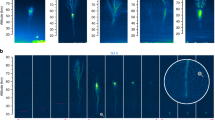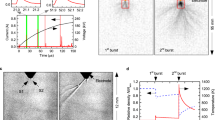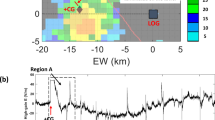Abstract
I HAVE suggested1 a mechanism to account for the occurrence of long electrical discharges in electric fields which are only of the order of one per cent of those generally believed2,3 necessary to cause sparkover. In the case of the leader stroke of the lightning discharge, the integrated lateral corona currents from the channel ultimately reach values of the order of thousands of amperes4, so that the characteristics of the channel must be those of the electric arc, though the discharge must start as a brush or glow discharge. This consideration led me to suggest that the steps in the initial leader stroke represent the transition of successive lengths of the channel from glow to arc conditions, and that a self-propagating discharge is initiated by this transition.
This is a preview of subscription content, access via your institution
Access options
Subscribe to this journal
Receive 51 print issues and online access
$199.00 per year
only $3.90 per issue
Buy this article
- Purchase on Springer Link
- Instant access to full article PDF
Prices may be subject to local taxes which are calculated during checkout
Similar content being viewed by others
References
Bruce, C. E. R., Nature, 147, 805 (1941).
Wilson, C. T. R., Phil. Trans., 221, 73 (1921). Schonland, B. F. J., "Terrestrial Magnetism and Electricity", 663 (Ed. J. A. Fleming, McGraw-Hill, 1939).
Gunn, Ross, Phys. Rev., 71, 181 (1947).
Bruce, C. E. R., Proc. Roy. Soc., A, 183, 228 (1944).
Meek, J. M., Nature, 148, 437 (1941).
Tamm, Arch. Elekt., 19, 235 (1928). Allibone, T. E., and Meek, J. M., Proc. Roy. Soc., A, 169, 267 (1938).
Bruce, C. E. R., "A New Approach in Astrophysics and Cosmogony" (London, 1944).
Author information
Authors and Affiliations
Rights and permissions
About this article
Cite this article
BRUCE, C. Transition from Glow to Arc Discharge. Nature 161, 521–522 (1948). https://doi.org/10.1038/161521a0
Issue Date:
DOI: https://doi.org/10.1038/161521a0
This article is cited by
-
Damages on the lubricated surfaces in bearings under the influence of weak electrical currents
Science China Technological Sciences (2013)
-
Formation of the High-Pressure Arc Column in Hydrogen
Nature (1956)
-
High-Pressure Glow-to-Arc Transitions with Tungsten and Copper Cathodes
Nature (1955)
-
The Positive Column of High- and Low- Current Arcs
Nature (1954)
Comments
By submitting a comment you agree to abide by our Terms and Community Guidelines. If you find something abusive or that does not comply with our terms or guidelines please flag it as inappropriate.



